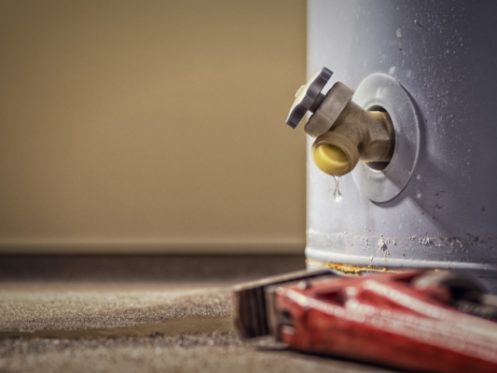The absence of hot water from your hot water taps can inconvenience you and your entire household. Getting into the bathroom ready to enjoy a warm bath only to discover your hot shower discharges cold water is upsetting. When you notice your water heater is not working, the first decision is to try anything that might restore your water heater’s functionality.
Water heater issues are challenging and a recipe for house fires. You should never try to resolve water heater issues by yourself, particularly if you don’t have technical knowledge. Therefore, it is advisable to contact a professional to identify the underlying problems with your water heater. Let’s explore why your water heater may fail to give you much-needed hot water.
1. A Broken Water Heater Thermostat
A water heater is equipped with a thermostat that regulates the water temperature. Getting the correct temperatures can be difficult if the thermostat breaks or becomes faulty. This will cause your hot water taps to dispense cold, lukewarm, or too-hot water. To check if your thermostat is the culprit, adjust it to higher temperatures to see if you will get the appropriate hot water temperature. If it fails, you need to consult a professional for a replacement. You should also ensure regular maintenance services to avoid frequent malfunctions.
2. Your Gas Water Heater Has a Limited Supply
If you use gas to fuel your water heater and fail to get hot water, the gas might be shut off, or you might have run out of supply. This means your heater doesn’t have enough fuel to heat the water in the tank. You must ensure the water heater has enough and a constant gas supply to work efficiently. If the gas tank has enough stock, check if the gas valve is shut and there is no obstruction in the gas pipes.
3. You Don’t Have a Power Supply
An electric heater requires a continuous supply of electricity to heat water. If your home lacks power, you will get cold water. You must ensure constant power flow and that the circuit breaker switch is on. If the breaker has tripped, flip it back, and see if you will get hot water. However, you must wait some minutes before the water in your tank gets hot before opening the hot water taps.
If you have power, the breaker’s switch is on, and you still can’t get hot water, there could be some underlying electrical problem that requires professional assistance.
4. Your Hot Water Tank Could Be Empty
Water heaters have tanks to keep the hot water for our use. You should check your hot water tank capacity if you fail to get hot water in your kitchen or bathroom taps. If the water is exhausted, you must wait for more water to get into the tank and give it enough time to heat. You can control hot water usage in your house by having planning schedules for using hot water. Also, consider buying a larger tank to hold enough hot water for your home’s needs.
5. Water Leakage Issues
A water heater tank stores hot water for use in your home. Sometimes, the tank can develop cracks and begin to leak water. This makes the water drain from the cracks, which may eventually empty the hot water in the tank.
In addition, your tank is connected to water pipes that feed it with cold water for heating. These pipes can cause leakage due to poor installation. Besides, they can develop holes or cracks due to old age, leading to water leakage. In this case, your hot water tank will not get enough water, causing your hot water taps to run dry.
It’s essential to contact an expert to perform thorough checks on your water tank and pipes to ensure they are in proper working condition. You must seal any cracks before they get bigger and replace the water pipes to avoid water leakage.
6. Your Gas Tank or Pipes Are Leaking
A gas water heater needs a continuous gas flow for its maximum efficiency. A gas leak can affect your water heater’s operations due to reduced or obstructed flow. Poorly installed gas pipes can cause leakage, limiting the amount of gas required to turn on your water heater. Also, a worn-out gas tank can develop rust and holes, leading to leakage.
If your water heater is on and you can smell gas, you need to take immediate action to avoid danger. It’s recommended to call your gas supplier to fix gas leakage and replace the pipes if necessary.
7. Gas Water Heater Has Pilot Light Issues
A gas water heater has a pilot light that powers your water heater. This corn-shaped blue flame should be on for the heater to function. Sometimes, the pilot tube can get clogged, making it hard to get a pilot light after several ignition attempts. The blocked tube will obstruct the gas flow, and the pilot light will not ignite.
A malfunctioning thermocouple can also cause the pilot light ignition problems. Once you open the gas valve, light the pilot light, and if it goes off immediately or frequently after several ignitions, your thermocouple could have issues. A thermocouple detects heat from the pilot light, allowing gas flow to the burner. A malfunctioning thermocouple will shut off the gas supply, and the pilot light will not ignite.
8. Low Water Pressure Issues
There are several causes of low water pressure that may result in limited or no hot water from your tank. First, a partially closed water valve can reduce the pressure of water getting into or out of your hot water tank. Secondly, the main line that supplies water to your home might be closed, shutting water flow to your reservoirs. Thirdly, hard water can cause sediments and limescale to build up and corrode the pipes and water tank walls. This will eventually cause a blockage, leading to low water pressure.
In addition, incorrect water pressure regulators and wrong-sized pipes can affect your hot water supply. If you have water supply issues, consult a plumber to help assess the status of your water pipes. In case of lime buildup, you can seek the assistance of tank cleaning services or a replacement.
9. Your Water Heater Is Old
An old water heater that has outlived its life expectancy will fail to generate hot water, affecting your household’s daily chores. As with other appliances, a water heater can work efficiently for approximately 10 years, after which it will become outdated. An old water heater will also increase repairs and electricity costs. You need an upgrade if you have an old heater that breaks down often. You can consult the experts for recommendations about the most efficient appliance to perfectly serve your home.
No Need to Wait Longer: Book an Appointment Now
Living in a house with frequent hot water issues can negatively affect your daily activities. You need to take quick action with a water heater that keeps breaking down to avoid fire incidences and other dangers that might arise from a faulty heater. At Summit Heating, A/C, Plumbing & Electrical, we have everything it takes to improve the functionality of your water heater.
We have been serving Denver, CO and the surrounding areas for over two decades; you can make us your go-to company today. We provide customized services from emergency repairs to top-quality installations. Besides, we offer heating, cooling, plumbing, and electrical services. Do not hesitate to call Summit Heating, A/C, Plumbing & Electrical and experience top-rated services from our NATE-certified technicians.


